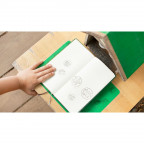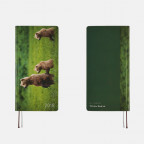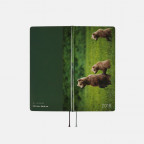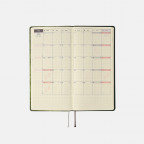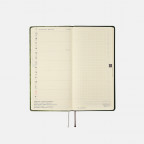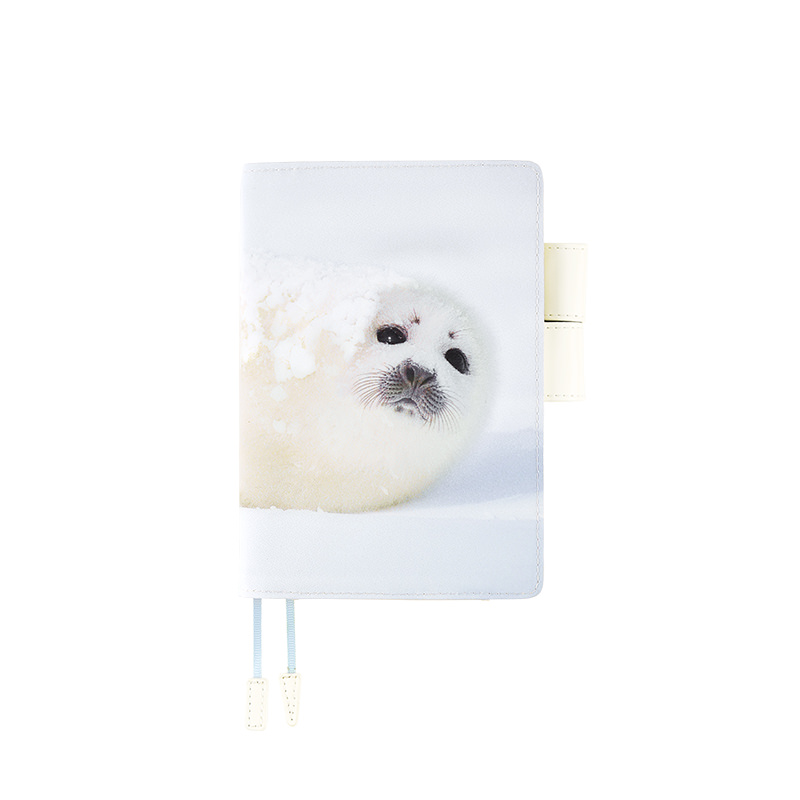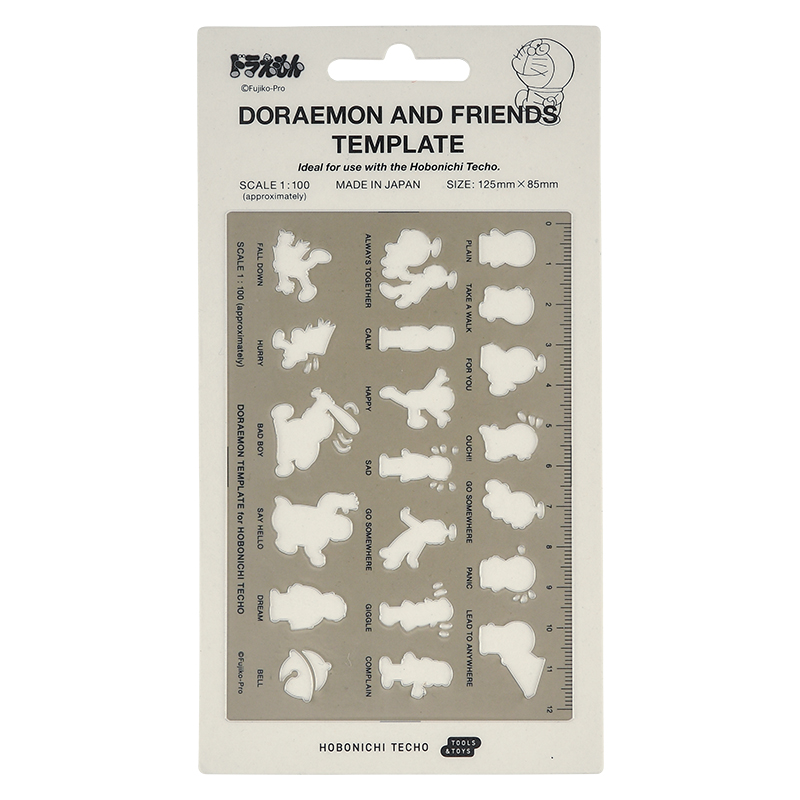Michio HoshinoGrizzly Mother and CubsWeeks Hardcover Book (Japanese)
This cover prominently showcases a piece by nature photographer Michio Hoshino (1952 - 1996), famous for his photographs of wildlife and everyday life in Alaska. The photograph features a Grizzly bear mother and her cubs.

In the photograph, the mother and her cubs stand on their hind legs, looking carefully at something in the distance. It’s a very charming scene, seeing the cub chewing on grass gently resting his hands against his mother’s back.
Hoshino spent many nights sleeping in tents when he was photographing wildlife like bears and caribou. It was because of his tenacity and persistence that he was able to capture such gentle expressions amid the great, unforgiving wilderness.
The glossy finish of the cover allows users to feel as if they’re carrying around a photography collection.

The book interior is a forest green to evoke the deep expanses of a forest, and includes a print of Michio Hoshino’s signature.
Included with the Hobonichi Techo Weeks is a clear, adhesive pocket you can affix to the inside of your cover, and a mini version of the Hobonichi Japan Railway Map 2018, which condenses maps of Japan’s major city railway maps into a single fold-out paper.

*A portion of the proceeds will be donated to Japanese animal rescue shelter Rencontrer Mignon.
About Michio Hoshino
Photographer born 1952 in Ichikawa City, Chiba Prefecture.
Entered the Keio University Faculty of Economics and joined the Exploration Club.
Spent a summer living together with an Eskimo family in Shishmaref, Alaska in 1973.
After graduating, spent two years as an apprentice to top nature photographer Kojo Tanaka.
In 1978, entered the University of Alaska's College of Natural Sciences.
Killed by a brown bear while on assignment in Kamchatka, Russia in 1996.
Received the 15th Kimura Ihei Award in for his photography.
Ranked as a Special Prize Winner by the Photographic Society of Japan.
Published the essay book “The Traveling Tree” and photography collection books such as “Arctic Odyssey: A Distant Northern Memory.”
Official Michio Hoshino Website
Staff List
- Photographer
- Styled Images: Kimiko Kaburaki / Product Detail: Hiroyuki Oe
- Stylist
- Megumi Nishimori
- Model
- Kaede Tanabe
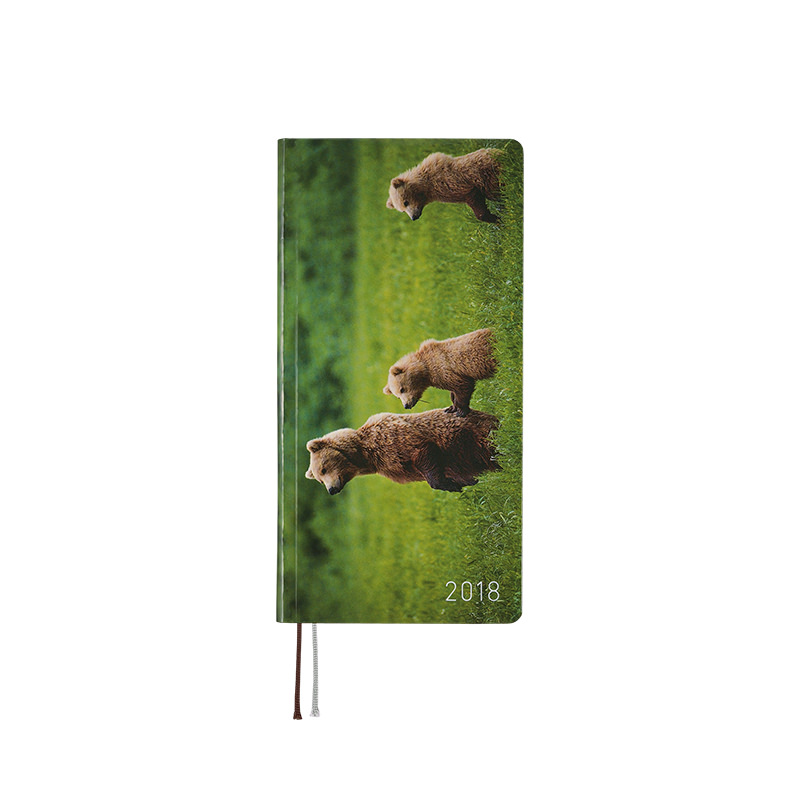
- Michio HoshinoGrizzly Mother and CubsWeeks Hardcover Book (Japanese)
- JPY2,592
- Normal
- Available
- 10
Specifications
- Overview
Size W: 96 x H: 187 x T: 8 mm / W: 3.8" x H: 7.4" x T: 0.3"
*Specifications may vary slightlyWeight Approx. 130 g Main material Paper - Contents (April Start Version)
Pages 240 pages Binding Stitch-binding Paper Type Thin, light Tomoe River paper resistant to bleeding and designed for planners. Graph Paper Size 3.55 mm Yearly Calendar 2017, 2018, 2019 Yearly Index Apr. 2018 - Mar. 2019 (2 pages) Monthly Calendar Mar. 2018 - Apr. 2019 (28 pages) Weekly Quotes One per week (Japanese) Weekly Calendar Feb. 26, 2018 - Mar. 31, 2019 (114 pages)
*All weekly pages include quotesGraph Paper 74 pages Informational Pages My 100 / Solar Terms / Favorite Local Japanese Foods / Hobonichi's TK Stretch / Chatting With People Around the World / Emergency Preparedness / Age Table / Conversion Table / Useful Links / Contact Book / Personal Notes Listed Information Week numbers / Rokuyo (Traditional Japanese calendar) / Solar terms (Japanese) / Japanese holidays / Moon phase (weekly pages include every phase, monthly calendars only include full and new moon)
Please Read Before You Buy
In order to provide you with the most satisfaction for your product, we've compiled a list of warnings, potential issues, and tips to keep in mind for this particular product. Please be sure to read this information carefully before placing your order.
- Test fountain pens before regular use
The Hobonichi Techo's Tomoe River paper is designed to prevent bleed-through, but some fountain pens and water-based ink pens are not compatible with this paper. When switching to a new pen, we recommend testing the pen somewhere in the book, such as the back memo pages, to see if the ink bleeds through or takes an especially long time to dry.
- Cover corners are slightly bumpy and shiny
The corners of the cover contain light traces of press marks, shines, and lumps. This is an unavoidable part of the manufacturing process.
- Imprinted year numbers may peel
The numbers of the year are stamped onto the cover in metallic or other colored leaf, so strong rubbing or everyday use may cause the numbers to peel off.
- Avoid storing in hot and humid places
Please avoid storing your product in hot, humid places or placing it atop other objects for long periods of time as this may result in lower quality and color stains.






